Limit children's snacks to 100 calories, health body says
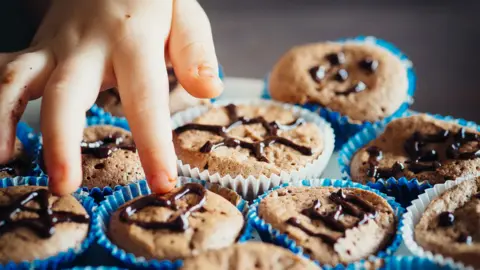 Getty Images
Getty ImagesHalf of the sugar young children in England consume comes from unhealthy snacks and sweet drinks, figures show.
On average, primary school children have at least three sugary snacks a day, Public Health England found.
This means they can easily consume three times more sugar than the recommended maximum.
PHE has launched a campaign to encourage parents to look for healthier snacks of no more than 100 calories - and to limit them to two a day.
The eight-week Change4Life campaign will offer money-off vouchers towards items including malt loaf, lower-sugar yoghurt and drinks with no added sugar in some supermarkets.
Children between the ages of four and 10 consumed 51.2% of their sugar from unhealthy snacks, including biscuits, cakes, pastries, buns, sweets, juice and fizzy drinks, PHE's National Diet and Nutritional Survey found.
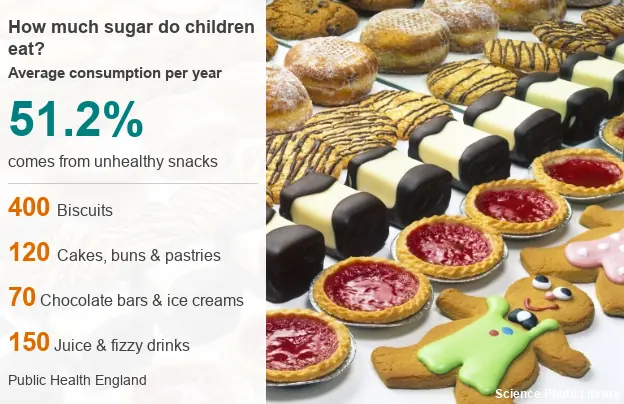
Each year children consume, on average, some 400 biscuits, 120 cakes, buns and pastries, 100 portions of sweets, 70 chocolate bars and ice creams and 150 juice drink pouches and cans of fizzy drink, the data shows.
Too much sugar can cause tooth decay and obesity.

Calories in snacks
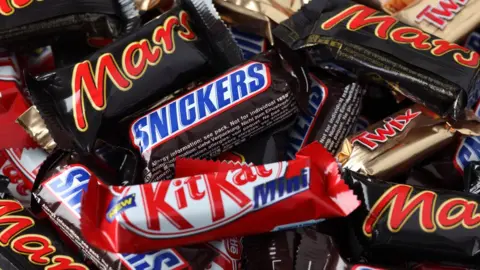 Getty Images
Getty Images- An ice cream - about 175 calories
- A pack of crisps - 190 calories
- A chocolate bar - 200 calories
- A pastry - 270 calories
Source: Kantar research group
Snacks containing no more than 100 calories
- Soreen malt lunchbox loaves (apple, banana or original malt)
- Petits Filous fromage frais (strawberry and raspberry, strawberry, strawberry and apricot, strawberry and banana)
- Fruit Shoot hydro water in apple and blackcurrant flavour
- Fresh or tinned fruit salad
- Chopped vegetables and lower fat hummus
- Plain rice cakes or crackers with lower fat cheese
- Sugar-free jelly
- One crumpet
- One scotch pancake
Source: Public Health England

The Change4Life campaign now wants parents to give their children a maximum of two snacks a day containing no more than 100 calories each, not including fruit and vegetables.
The campaign will offer parents special offers on a range of healthier snacks - ones with 100 calories or fewer - at selected supermarkets, Public Health England said.
Healthier suggested snacks include packs of chopped vegetables and fruit, malt loaf, sugar-free jelly, and plain rice crackers.
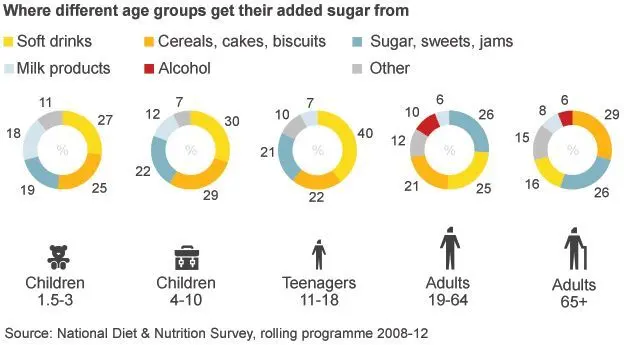
Public Health England said it had also improved its app that reveals the content of sugar, salt and saturated fat in food and drink.
Lunch box snacks
Dr Alison Tedstone, chief nutritionist at Public Health England, told the BBC she hoped the campaign would help to "empower" parents to make healthier snacking choices for their children.
"If you wander through a supermarket you see many more things being sold as snacks than ever before," she said.
"What has changed is kids' lunch boxes are getting full of snacking products. It leads to a lot of calories for lunch.
"Our research showed us that parents appreciated a rule of thumb. They were surprised how much sugar their children were consuming in snacks."
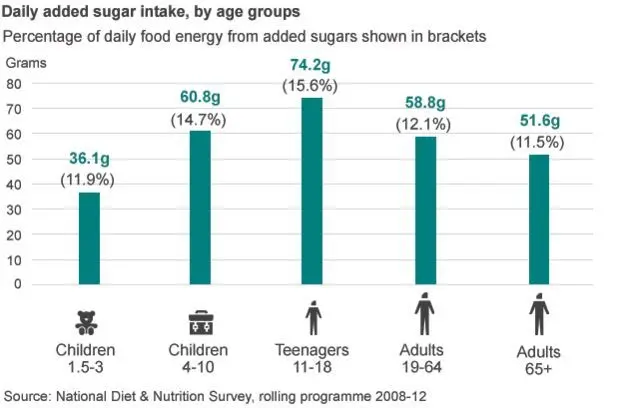
Justine Roberts, founder of Mumsnet, said: "The volume of sugar kids are getting from snacks and sugary drinks alone is pretty mind blowing, and it can often be difficult to distinguish which snacks are healthy and which aren't.
"This rule of thumb from Change4Life will help parents make healthier choices, which can only be a good thing."
Public Health England has previously called on businesses to cut sugar by 20% by 2020, and by 5% in 2017, but experts have questioned how the targets can be enforced.
A sugar tax on the UK soft drinks industry has already been announced and will come into force next April.
Follow Alex on Twitter.
